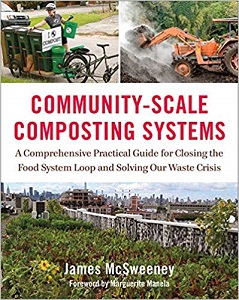
Author James McSweeney passionately believes that food scraps are resources -- not waste -- and has spent a career consulting for farmers, businesses and community based non-profits on how to turn organic material into high-quality compost. His expertise and knowledge have been collected into a textbook that details not only the various techniques for making compost at scale, but also all the economic, logistic and business considerations required for success. The book is very well-organized with charts, worksheets for planning, diagrams and excellent color photos. McSweeney’s writing is scientific but also engaging, with just enough anecdotal examples and case studies to keep readers interested in what could be a very dry topic. Footnotes document extensive references, while sidebars give focused information such as “common regulations for food scrap composters.”
In the introduction McSweeney distills the essence of successful composting to the four Cs: cover, contain, complete and carbon. The following chapters explore several business and system models (such as drop-off, school, commercial, and community garden) with an economic analysis for each system. The biology and chemistry behind the compost process is detailed in another chapter. Proven composting methods, such as windrows and aerated static piles, are explained in the following chapters. Finally the text concludes with chapters on site management and marketing the final product.
This book would be useful for anyone on the composting continuum from serious home scale or multi-family to neighborhood, school or workplace. The principles apply to farms, community gardens, and demonstration sites as well as large-scale municipal and industrial enterprises.